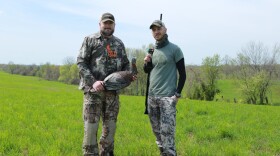On a recent trip to Philadelphia, Ken Perry stood on the 18th floor of a hotel and realized he'd forgotten to pack a pair of speakers. He was there for a conference and needed the equipment, so he decided to buy a new pair.
Under different circumstances, this could have been a challenge for Perry. He's blind and had never been to Philadelphia.
But he had a smartphone and an app called Nearby Explorer, audio wayfinding technology developed at the American Printing House for the Blind in Louisville, where Perry works. He turned to the app to get him from the high-rise hotel to the speaker aisle at the nearest Radio Shack.
"I did that with no help," he said, although he also gave some credit to his guide dog.
That errand, and others like it in Louisville, Philadelphia and other cities, would have been almost impossible without the app, he said.
Nearby Explorer does more than just give users directions to their destination, as Google Maps might. The app also provides specific information about surrounding buildings, cross streets, intersections and bus stops.
When on a sidewalk, Perry can point his phone in a direction and be provided the name of every street that crosses his path within a half mile. When he points it at a building, he's told how far away the building is, to the foot, and what its street number is. When he nears a bus stop, he's told what bus is next and where it will take him.
[soundcloud url="https://api.soundcloud.com/tracks/232835098" params="color=ff5500&auto_play=false&hide_related=false&show_comments=true&show_user=true&show_reposts=false" width="100%" height="166" iframe="true" /]
With help from the app, he can "get out and wander" like never before, he said.
And it wouldn't be possible without data.
Programmers and engineers at the American Printing House for the Blind started building the app with a collection of proprietary data, said Rob Meredith, one of those programmers.
That data was OK, he said, but they wanted something more.
Staff members showed up at a regular meetup of the Civic Data Alliance, a technology-centric collaborative in Louisville, and expressed their desire to have better data. They needed information that was inexpensive and more specific.
With the help of the alliance, they were able to get Louisville Metro to release data relating to building footprints. The data includes specific building shapes and street numbers, key information that can help blind residents find the places they need to be, Meredith said.
That data took the app to another level, he said. It gives users a chance to experience their surroundings rather than just find their way through them.
Theresa Reno-Weber is chief of performance and technology for Louisville Metro. Her team oversees efforts to open more Metro data to the public and help expand the city's open data portal.
"It's a great example of people using data in ways that surprise you to benefit themselves and to benefit others," she said of the app.
Louisville Mayor Greg Fischer in 2013 issued an executive order to make all city data "open by default." In theory, that means any data collected and managed by public entities should be open, Reno-Weber said.
But the city has a glut of data, some of it of no practical use to residents, she said. Her team is tasked with sifting through that data, finding what's useful and presenting it in a way that's usable and can be updated.
It can be an arduous process, she said.
Still, it's a process she believes is worth it. She's already challenged other cities to do the same. If other cities can open their data up in the same way Louisville is working to do, then users of apps like Nearby Explorer can have the same robust experience no matter where they are.
"A lot of cities are trying to invest in unlocking their data, and what all of us are asking ourselves is, where do we put our time and energy so that it really makes a difference, because there is some data that may be never be clicked on," she said.
City officials are beginning to reach out to residents to get an understanding of what they want to see made available, and what they can use, she said.
“That’s really the point of putting data out there," she said.
The allure of the unknown that open data presents can also be a catalyst for economic vitality, said Michael Schnuerle of the Civic Data Alliance. He's one of the people who helped format the city's data into something the American Printing House for the Blind could use.
“People can take that data and build tools, apps and analysis that leads to a place where people want to do business," he said.
And although there are costs associated with opening data, he said people often fail to realize the savings that can come with city-managed open data portals.
For example, fulfilling open records requests can be far cheaper when a city puts its data in an easy-to-navigate online portal.
"When people typically do those requests for some subset of a large data set, that goes through four or five people, and that takes a lot of time," he said. "And the department has to handle that for everybody that makes that request."
Beyond economics and cost savings, the accessible data has helped create a tool that is boosting the quality of people's lives.
For Ken Perry, that means pointing out street signs and restaurants for his wife as she drives the couple in their van. He can go for walks alone and always know precisely where he is.
In the near future, data may become available for benches, mailboxes or street signs, which can be hazardous to the blind.
"The more data we can get, the more things we can do," Perry said.
The Nearby Explorer app is available for Android devices for $99.







